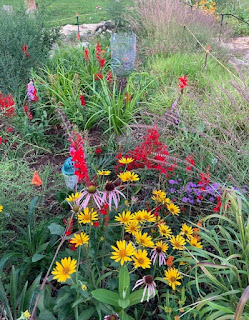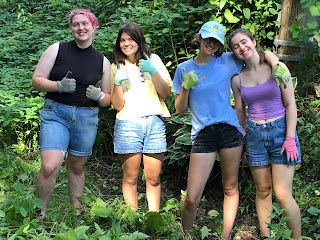 Emotionally these last few weeks feels like a roller-coaster ride. The highs were a pleasant May 21st Lake Wingra Watershed Gathering, the installation of our two co-senior Unitarian Universalist ministers, Kelly Crocker and Kelly Asprooth-Jackson, our 43 wedding anniversary, and the May 28th work session at Prospect Gardens. Besides the continued brutal Russian invasion of Ukraine, we experienced these breath taking loops: the Buffalo massacre of ten Black Americans, the Uvalde school massacre of 19 fourth graders and two teachers, and the continued political paralysis about the need for gun control.
Emotionally these last few weeks feels like a roller-coaster ride. The highs were a pleasant May 21st Lake Wingra Watershed Gathering, the installation of our two co-senior Unitarian Universalist ministers, Kelly Crocker and Kelly Asprooth-Jackson, our 43 wedding anniversary, and the May 28th work session at Prospect Gardens. Besides the continued brutal Russian invasion of Ukraine, we experienced these breath taking loops: the Buffalo massacre of ten Black Americans, the Uvalde school massacre of 19 fourth graders and two teachers, and the continued political paralysis about the need for gun control.
The need for refuge led me to Sharon Salzberg's forty-five minute virtual Metta: A Community Vigil. Sharon is a noted Buddhist meditation teacher from Insight Meditation Society, Barre, Massachusetts. Sharon is widely known for teaching about metta. Metta, also called loving-kindness, refers to a mental state of unselfish and unconditional kindness to all beings.
Sharon shared the following two poems as answers to the question she suggested we ask ourselves: “What sustains you?” Knowing what sustains you helps getting through these wrenching times. We ended the 45 minute session extending metta to ourselves and others.
Everything Falls Away | Parker J. Palmer
“There's a thread you follow. It goes among
things that change. But it doesn't change.
-William Stafford
Sooner or later, everything falls away
You, the work you've done, your successes,
large and small, your failures, too. Those
moments when you were light, along-
side the times you became one with the
night. The friends, the people you loved
who loved you, those who might have
wished you ill, none of this is forever. All
of it is soon to go, or going, or long gone.
Everything falls away, except the thread
you've followed, unknowing, all along.
The thread that strings together all you've
been and done, the thread you didn't know
you were tracking until, toward the end,
you see that the thread is what stays
as everything else falls away.
Follow that thread as far as you can and
you'll find that it does not end, but weaves
into the unimaginable vastness of life. Your
life never was the solo turn it seemed to
be.
It was always part of the great weave of
nature and humanity, an immensity we
come to know only as we follow our own
small threads to the place where they
merge with the boundless whole.
Each of our threads runs its course, then
joins in life together. This magnificent
tapestry-
this masterpiece in which we live forever.
The World Has Need of You | Ellen Bass
everything here seems to need us…
—Rilke
I can hardly imagine it
as I walk to the lighthouse, feeling the ancient
prayer of my arms swinging
in counterpoint to my feet.
Here I am, suspended
between the sidewalk and twilight,
the sky dimming so fast it seems alive.
What if you felt the invisible
tug between you and everything?
A boy on a bicycle rides by,
his white shirt open, flaring
behind him like wings.
It’s a hard time to be human. We know too much
and too little. Does the breeze need us?
The cliffs? The gulls?
If you’ve managed to do one good thing,
the ocean doesn’t care.
But when Newton’s apple fell toward the earth,
the earth, ever so slightly, fell
toward the apple as well.
Sharon Salzberg's question and the two poems reminded me of my fundamental beliefs. These sustain me during these difficult times. Nearly a year ago, I shared these during a church service. Here's a recap.
Life is a
flow of joys and sorrows. The Buddha is reported to say that life is filled with
10,000 joys and 10,000 sorrows. In the midst of this
flow, joy, peace and contentment are possible through metta, gratitude, mindfulness, and
meditation.
Life is Impermanent. Echoing Parker Palmer's message,-- Everything Falls Away-- life is transitory, in constant flux, with everything arising and passing away moment by moment. The common phrase, And this too shall pass, is another expression of the impermanent nature of our experiences.
Take care of those in the “Corner of your Universe”, a phrase used by my friend, Dave. In my nearest corner are neighbors who help tend Prospect
Gardens, friends, and family members; especially Ann, my wife and Emily, my
daughter. My church, First Unitarian Society, is there and eight individuals in my Chalice Group. Also
in my corner are those in two Buddhist associated groups that I meet with monthly. And then
there is Chris, a man without a permanent home. He once provided the newspaper Street Pulse while standing in front
of Trader Joes in exchange for an offering. Chris is still in his usual Trader Joes spot but without the newspaper. My chats with Chris and offering of a few dollars continue.
Our lives are imbedded in an
interdependent web of existence. In an October 2021 blog entry I commented on Thich Nhat Hahn interbeing which underscores the deep interrelationships
between all things. Ellen Bass has a similar perspective on life because in her poem she asks the question: What if you felt the invisible tug between you and everything?
Not Knowing. Many times in
life we just don’t know. Right now, it's okay if we can't figure it all out (it may be impossible) even though our hearts are breaking. This doesn't mean we lapse into apathy and indifference. We spend our energy doing what we can while offering compassion to all those who are suffering.
On a warm and somber Memorial day, I remembered these beliefs while noticing other facets of my life which sustains me. Ann and I, for the sixth year, planted the six pots on our deck; adding beauty to the otherwise bland deck of our third floor apartment. We finished just before the light rain dampened the flowers. Here's one of two large planters.
I often do Qigong early in the morning and have breakfast on the deck. Sometimes the swopping swallows entertain me or a hawk glides by. Early in spring geese fly by. The sandhill cranes may call from the nearby arboretum or a brilliant Gold Finch may flash by. This daily routine filled with snapshots of nature sustains me.
Readers of this blog know that Prospect Gardens serves as a refuge. Periodically for a few hours I feel close to the earth while experiencing the companionship of fellow volunteers. We are a community maintaining a beautiful site in our neighborhood.

Saturday, May 28th, was another opportunity to feel the benefits of tending the Gardens. Ann and I arrived before the other two volunteers, Joyce and Frosya. Joyce is a frequent volunteer and this was Frosya's second time. She is a West High Leo Club member and is completing her sophomore year. Ann, the fourth volunteer, took the picture.
We accomplished a lot. A few more Leo Cub members were expected. While we missed them, Frosya is such a diligent gardener, that she made up for the two or three absent Leo Club members.
Thank you Frosya, Joyce and Ann. Frosya and I weeded and mulched an area near the raspberry patch. Joyce weeded the east side of the Regent side stairs. Frosya also joined Joyce in the perpetual struggle with Bishops Weed. Ann weeded and hauled away much of the uprooted weeds.
I planted sixteen free native plants received from Argecol Native Plant Nursery during the May 21st Lake Wingra Watershed Gathering. Agrecol was one of the 27 hosts at tables with native prairie plants as prizes. See my last blog for details about the Gathering. I stopped by their table and asked how to enter a drawing for the plants. The young man said he didn't know because nobody set up the rules. I introduced myself as one of the Gathering's organizers. The young man smiled, said "you qualify," and handed me the tray. Thank you Agrecol.
Here's Frosya mulching. This area was once part of the raspberry patch and for unknow reasons, the plants disappeared. I planted some of the free Agrecol plants with hopes that they will survive. Note the little yellow and blue Ukrainian flag. We could use a larger flag.
Joyce pausing from her labors. Joyce removed Bishops Weed as she worked her way up the slope starting near the base. Bishops Weed may very well be an exception to my belief that all things are impermanent. The rocky slopes are a perfect environment for Bishops Weed. Every season, if the offsprings could talk, they would shout "We are back."
I end by returning to Sharon Salzaberg's question: What sustains you? If you wish, reflect on this question and hold what you learn close to your heart. The next two weeks will be challenging, as funerals continue in Uvalde for the nineteen children and two teachers. A return to Prospect Gardens and removing Bishops Weed may be needed.



















































